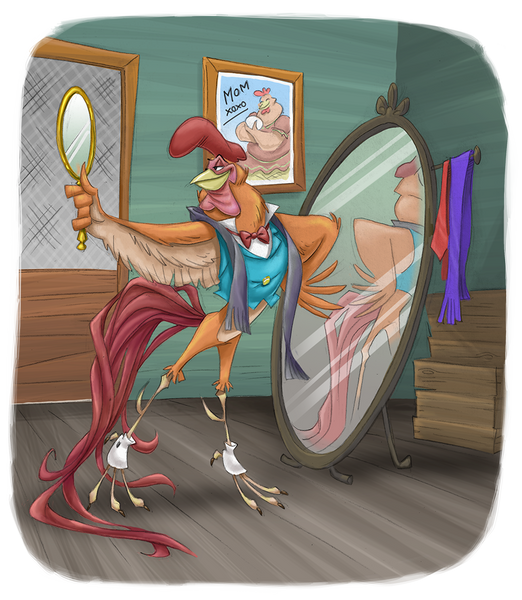- Continue Shopping
- Your Cart is Empty
The Proud Chicken

The Tale of the Proud Chicken is the most humorous of Theo’s Tales of Little Overhill, so far. I really had a fun time writing it. Although each of the tales contain elements of humor, the Proud Chicken is funny from cover to cover, beginning with its name. To me, just the sound of the word chicken is funny. I know, I’m weird.
I love to make people laugh; it’s what drew me into the cartoon industry back in the 1970s. Laughter helps let down barriers, it puts us more at ease. Laughter is also a good medicine (Proverbs 17:22). Not only is this biblically true, but scientifically as well. Medical institutions and universities have shown that laughter is, indeed, good for us; it lowers stress, prevents heart disease, and aids in a higher quality of life.
So practice laughing! Be fluent in it!
In many ways The Proud Chicken is like a cartoon. It is both fast-paced and visually funny. From the opening illustration to the closing one, I trust that children (and their parents) will be smiling or laughing, all the while learning an important biblical truth. You see, humor is also a great vehicle for communicating truth.
The Proud Chicken is a retelling of Jesus‘ parable of the Prodigal Son (Luke 15:11-32). The prodigal son is the third in a trilogy of parables found in Luke 15 that deal with a lost sinner being found––the lost sheep, the lost coin, and then, of course, the lost son.
The first two parables illustrate God seeking the lost, as illustrated by a shepherd leaving the ninety-nine sheep to hunt for the one, and a woman scouring her house until she finds a valuable coin. The point of these parables is that the sheep would remain lost, the coin would be unfound, except for the tenacious pursuit of our Lord and Savior. God is the initiator, the First Cause of our salvation.
He is the pursuer of our souls, the “Hound of heaven,” as it were.
What is unique about the prodigal son tale is the fact that we don’t see the Father pursuing the lost son at all. Instead we see the son coming to his senses after a season of debauchery. That is, he changes his mind about the road he has taken and returns to the Father. In this we view salvation from man’s perspective, the result of the Father’s initial pursuit and wooing (John 6:44).
We are all prodigals in one way or another, past or present, so we will identify with Chadwick the rooster. We may not look like him but, there is a little bit of Chadwick in each of us. Each of us has gone his own way, none of us have pursued God, all of us have raised the fist of rebellion at God. We are sinners everyone. Were it not for God’s great love for us, were it not for His dogged pursuit of our souls, each of us would remain spiritually dead and lost in our transgressions and sins.
Jesus said that if anyone comes to the Father he will in no way cast him out (John:6:37). What we see in the parable of the prodigal son is the great love of our heavenly Father. We see how warmly He receives the repentant sinner. With the Father clothing the prodigal with a royal robe, placing a signet ring on his finger, and sandals for his feet, we see a picture of the new birth, our adoption as sons and daughters into the royal family of our heavenly Father, as well as the authority that goes with it.
Underlying the parable is the concept of grace. It is a sonship undeserved. The pharisees of Jesus’ day had no understanding of grace; theirs was a religion of outward appearance, of works.
The prodigal son does not deserve the reception he is given; he deserves to be treated as a slave. He deserves to remain an outcast. But Jesus makes it clear that it’s not by our own works of righteousness that we are saved, it is by grace through faith (Ep:2:8-10).
In the Tale of the Proud Chicken, Theo says this very thing in response to Chadwick’s humble contrition. Grace. We are saved by God’s unmerited favor. Our Father receives the believing sinner with open arms, clothes him or her in the righteousness of His dear Son. He sets before each child of God a path of righteousness.
It is a finished work!
I hope you will enjoy this new book––smile as you read it with your children. Most of all, I encourage you to ponder the parable of the prodigal son, put yourself in his position, and marvel at the great love and grace that our heavenly Father bestows upon us.






Michael Joens
Author